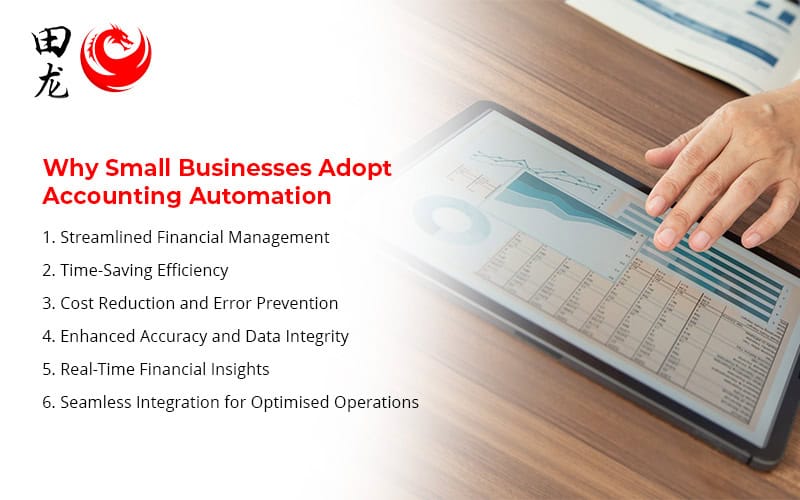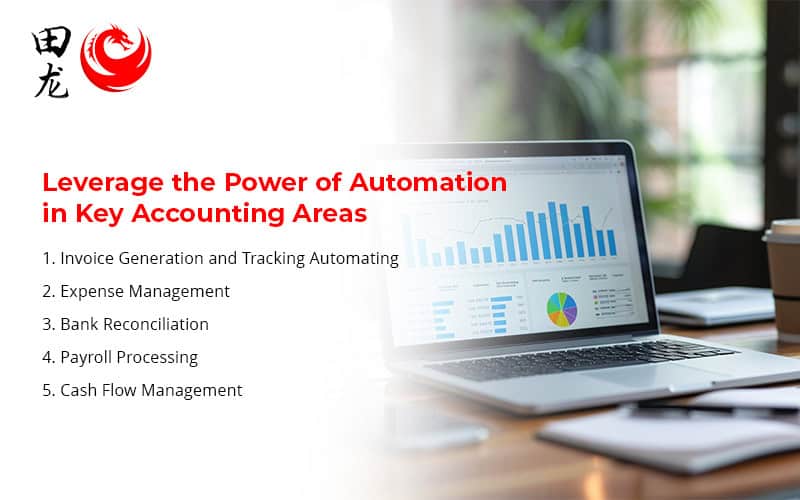Given the constant technological advancements, changing consumer expectations, and global market shifts, small businesses are facing increasing pressure to stay competitive by embracing digital transformation.
One of the most impactful shifts is the rise of accounting automation, revolutionising the way financial processes are managed. Gone are the days of manual bookkeeping and complex spreadsheets—advanced accounting software programs for small businesses now make finance management, expense tracking, and regulatory compliance more streamlined and efficient than ever before.
As automation takes centre stage, businesses can save valuable time, reduce human error, and improve their financial operations. In this article, we’ll explore the key accounting automation trends small business owners should watch to future-proof their operations and gain a competitive edge in an increasingly tech-driven world.
The Role of Automation in Small Business Accounting
Why Small Businesses Adopt Accounting Automation
As small businesses strive to maintain competitiveness and optimise their operations, embracing accounting automation has become the key to simplified and enhanced financial management. Accounting automation involves using specialised financial automation tools to handle invoicing, expense tracking, tax compliance, and other tasks. Deploying small firm accounting software not only reduces the need for manual input but also streamlines redundant financial processes. Here’s how accounting automation benefits small businesses:

1. Streamlined Financial Management
One of the primary reasons small businesses adopt accounting automation is to manage their finances more efficiently and accurately. By automating routine tasks such as bill payments and expense reviews, businesses can keep financial data up-to-date without constant manual intervention. As such, business owners are able to dedicate more time to strategic tasks like growth and expansion.
2. Time-Saving Efficiency
Manual financial management is often time-consuming, especially for small businesses with limited resources. Accounting automation significantly shortens the time spent on repetitive tasks like data entry, transaction recording, and financial reporting.
With accounting automation in place, businesses can complete these tasks in a fraction of the time it would take manually, freeing up valuable time for other important business activities. In other words, they can focus on improving customer engagement, marketing, and product development.

3. Cost Reduction and Error Prevention
By eliminating the need for manual labour, accounting automation helps businesses minimise operational costs. Business owners no longer need to mass hire administrative personnel and accounting service providers in Singapore for routine accounting tasks. Cloud accounting software can efficiently handle these functions with reduced risk of human error. Whether it’s an incorrect invoice, missing expense entry, or miscalculation of taxes, accounting automation helps to avoid these costly mistakes. Automated systems ensure accurate data entry and flag discrepancies in real time, preventing issues that may affect the bottom line.
4. Enhanced Accuracy and Data Integrity
Another key advantage of accounting automation is its ability to ensure data accuracy. Software solutions are designed to automatically track and record financial transactions, reducing discrepancies that often arise from manual entry. This consistency ensures that businesses can rely on accurate financial reports when making decisions, providing a strong foundation for sound financial planning. In addition, accounting automation helps maintain data integrity by reconciling records, verifying tax calculations, and preventing misreporting.
5. Real-Time Financial Insights
Having access to real-time financial data is crucial for business owners to make informed decisions. Accounting automation provides small businesses with up-to-the-minute reports on their financial status, including cash flow, profits, and expenditures. This instant access to financial information enables business owners to monitor their financial health, identify trends, and make proactive decisions to keep operations on track. With real-time insights, business owners can respond quickly to market changes, ensuring their business stays agile and competitive.

6. Seamless Integration for Optimised Operations
Small businesses can also integrate accounting automation with other business systems, such as inventory management, customer relationship management (CRM), and payroll automation solutions. This integration allows businesses to optimise their operations by eliminating data silos and facilitating effective communications across diverse systems.
When accounting software is linked with other systems, businesses gain a holistic view of their financial and operational performance. This interconnectedness makes it easier to track overall business performance, identify areas for improvement, and make data-driven decisions that support growth.
Leverage the Power of Automation in Key Accounting Areas
As small businesses seek to optimise their operations and enhance their financial management, leveraging automation in key accounting areas has become a game changer. With the right accounting software, tasks that once required hours of manual work can now be completed efficiently and accurately. Let’s dive into how accounting automation is transforming the following areas:

1. Invoice Generation and Tracking
Invoice generation and tracking is one of the most critical yet time-consuming tasks in accounting. Manual invoicing often leads to errors in billing, delayed payments, and missed opportunities to follow up on overdue invoices. Accounting automation simplifies this process by generating invoices automatically based on pre-set templates, reducing human error and ensuring consistency in billing.
In addition to invoice creation, automation can send invoices to clients on time and even set up automated reminders for overdue payments. This eliminates the need for manual follow-ups and helps businesses maintain a healthy cash flow by ensuring timely payments.
2. Expense Management
Tracking and managing expenses is essential for maintaining a clear understanding of a business’s financial health. Automation enhances this process by syncing accounting software with bank statements and credit card transactions, automatically categorising expenditures as they occur. This ensures that every expense is recorded accurately in real time, preventing missed entries and simplifying tax preparation.
With automated expense management, businesses can easily track spending patterns, identify areas for cost-saving, and ensure they stay within budget. This real-time data gives business owners the ability to monitor their finances at a glance and make informed decisions without having to sift through piles of receipts or manual records.
3. Bank Reconciliation
Bank reconciliation is an integral part of any business’s accounting practices, aligning the transactions recorded in the books with those on the bank statements. Traditionally, this was a laborious task, requiring hours of manual effort to compare transaction logs. Fortunately, accounting automation now makes bank reconciliation seamless by automatically matching transactions between the bank account and accounting software.
The process ensures that discrepancies are flagged early, and records are accurate. As a result, businesses can maintain the integrity of their financial data, ultimately leading to more reliable financial statements.
4. Payroll Processing
Managing payroll is a complex process, especially when dealing with various deductions, tax laws, and benefits. Automating payroll processing eliminates the risk of errors and guarantees compliance with tax regulations.
Payroll software can calculate wages, withholdings, deductions, and bonuses, and even automatically process payments to employees. This means businesses can minimise administrative overhead, ensure employees are paid accurately and on time, and stay compliant with ever-changing tax laws.
5. Cash Flow Management
Maintaining a steady cash flow is essential for small businesses to avoid liquidity issues and ensure operational stability. By deploying cash flow management software, businesses can keep track of both incoming and outgoing payments in real time, quickly identifying any shortfalls or surpluses.
Besides tracking payments, accounting software also supports automated invoicing, payment reminder alerts, and even future cash flow forecasts. This foresight enables businesses to make more informed decisions about when to make investments, manage debt, and maintain liquidity.

Future Outlook: What’s Next for Accounting Automation?
Emerging Trends in Accounting Automation
As technology continues to evolve, new trends in accounting automation are reshaping the financial industry for small businesses. These innovations not only enhance operational efficiency but also empower businesses with greater financial insights. Here are some emerging trends set to drive the future of accounting automation.
1. AI and Automation
Artificial Intelligence (AI) is rapidly transforming the accounting profession by automating routine tasks such as data entry, invoice processing, and transaction categorisation. AI-powered accounting software can quickly analyse large volumes of financial data, reducing the time spent on manual tasks and minimising the risk of errors.
Apart from basic automation, AI also provides personalised insights, financial predictions, and tailored advice to business owners. This means that instead of simply performing repetitive tasks, AI systems are capable of analysing trends and offering recommendations. Small businesses benefit from these insights to make more informed financial decisions. Whether it’s spotting emerging patterns in cash flow or advising on optimal budgeting strategies, AI in small business accounting is set to become a powerful tool in shaping the future of accounting automation.
2. Predictive Analytics & Cloud Solutions
Powered by AI and machine learning, predictive analytics for finance enables small businesses to anticipate changes in their financial landscape and plan accordingly, reducing the likelihood of cash shortages or missed opportunities. By analysing historical data and recognising patterns, AI-driven predictive analytics can forecast financial trends, such as cash flow fluctuations, upcoming expenses, and potential areas for investment.
At the same time, cloud accounting is gaining traction as a key tool for businesses that require real-time financial collaboration, data security, and scalability. Cloud-based accounting software allows businesses to access their financial data from any location. With the added benefit of automatic software updates, cloud solutions keep businesses compliant with the latest tax laws and accounting standards, all while offering robust data protection.
3. Integration and Unified Platforms
The future of accounting automation also encompasses fully integrated platforms that work seamlessly with other business tools. Modern accounting software is increasingly being designed to integrate with Customer Relationship Management (CRM) systems, payroll platforms, inventory management tools, and other business applications. This integration facilitates smoother data flow across different departments, ensuring that financial information is consistent and up-to-date across the organisation.
Furthermore, businesses can now leverage APIs (Application Programming Interfaces) to customise their accounting systems to meet industry-specific needs. With the ability to create tailored integrations and workflows, businesses find it easier to optimise their accounting processes based on unique operational requirements. These include managing multiple currencies, tracking specific project costs, or handling regulatory compliance across different markets.
4. Mobile Accessibility & User Experience
As businesses become more mobile and workforces become more remote, mobile accessibility in accounting software is becoming a key feature. Mobile-first designs enable business owners and accountants to access real-time financial data from their smartphones or tablets, offering on-the-go visibility into key metrics like cash flow, accounts payable, and accounts receivable.
Meanwhile, improvements in user experience (UX) design are enhancing the usability of accounting software. User-friendly interfaces, intuitive dashboards, and AI-driven suggestions simplify the accounting process for business owners, even those without a financial background. By making financial data and tools more accessible, accounting software is becoming more inclusive and practical.
5. Regulatory Compliance & Tax Automation
Keeping up with ever-changing regulations is one of the challenges small businesses face. However, AI is now playing a part in automating compliance checks and keeping businesses up-to-date with the latest tax laws. AI-powered software can automatically track regulatory changes, helping businesses meet both local and international compliance requirements.
Tax automation is another area where AI is making an impact. The process of tax filing, which often involves complex calculations and documentation, can be automated with accounting software, reducing the risk of costly errors and ensuring businesses comply with tax deadlines. For global businesses, accounting automation also supports international compliance, including the management of multiple tax jurisdictions and currencies, making it easier for businesses to operate across borders.
6. Blockchain and Cryptocurrencies
Blockchain technology is benefitting businesses with its ability to provide secure, transparent, and tamper-proof financial records. By recording transactions on a distributed ledger, blockchain enhances the integrity and traceability of financial data, making it easier to track and verify transactions.
Moreover, as cryptocurrencies become more widely accepted, businesses may now explore the use of blockchain to process cryptocurrency transactions. It is possible for accounting software to integrate with blockchain networks for automated recording and cryptocurrency payment processing. The positive outcome is streamlined financial transactions.
Potential Challenges of Accounting Automation for Small Businesses
While accounting automation offers numerous benefits, small businesses may face some challenges when implementing these technologies. Therefore, it’s important to be aware of these potential obstacles to ensure minimal disruptions.
1. Setup and Integration
Implementing accounting software can disrupt daily operations, especially when aligning it with existing systems. The integration process often requires significant time and effort to ensure that the new software works well with other business tools. If not properly managed, this integration potentially leads to temporary inefficiencies, data discrepancies, and other issues.
2. Costs
The initial costs of purchasing accounting software and subscribing to cloud-based services can be a significant barrier for small businesses with limited budgets. Moreover, ongoing maintenance, software updates, and potential training for staff can add to the financial burden. For some businesses, these costs may outweigh the perceived benefits, especially if the return on investment is not immediate.
3. Data Security
Storing financial data in the cloud can raise concerns about cybersecurity and data protection. With sensitive financial information being handled and stored online, businesses must ensure that their cloud providers implement robust security measures to prevent data breaches and cyberattacks. Any security vulnerabilities can expose businesses to financial and reputational damage, making data security a key consideration when adopting automation tools.
4. Resistance to Change
Transitioning from traditional manual accounting methods to automated systems can meet with resistance from employees and business owners alike. Some individuals may be reluctant to embrace new technology, preferring to stick with familiar processes. Overcoming this resistance requires adequate training, clear communication about the benefits, and ongoing support to help staff adjust to the new system.

5. Technical Issues
Technical glitches or system outages can disrupt business operations and cause delays in financial processes. Software bugs, compatibility issues, or poor internet connectivity could result in downtime, preventing businesses from accessing important financial data or completing transactions. While accounting automation is reliable, technical issues remain a potential risk, so having a contingency plan in place is crucial.

6. Compliance Risks
As tax laws and industry regulations frequently change, there is a risk that regulatory compliance automation tools may not always stay updated. If the software is not regularly updated to reflect new tax codes or compliance standards, businesses can unknowingly fall out of compliance, thereby facing fines or penalties.
Preparing Your Small Business for Future Accounting Trends
By preparing for the future of accounting automation, small businesses can optimise financial management for more efficient financial processes. Below are some key steps to follow:
1. Adopt Cloud-Based and AI-Driven Solutions
Transitioning to cloud-based accounting software is one of the most effective ways to future-proof your financial processes. Cloud solutions offer flexibility so you are able to access your financial data from anywhere, at any time. This means you and your team can work on financial documents simultaneously, reducing delays and enhancing overall efficiency.
In addition to cloud accounting, incorporating AI-powered tools also significantly enhances your business’s financial operations. AI-driven software can automate routine tasks such as invoicing, expense tracking, and data entry, saving valuable time and reducing human error. Furthermore, AI can provide personalised financial insights and predictive analytics, helping you make informed decisions and anticipate future trends.
2. Ensure Integration and Regulatory Compliance
As your business grows, make sure your accounting software integrates seamlessly with other tools you use. Integration simplifies workflows and reduces the need for duplicate data entry, ensuring that all business systems work together efficiently. For instance, linking your accounting software with your CRM system allows you to automatically track customer payments.
With frequent changes in tax laws and industry regulations, businesses must select accounting software that automatically updates to reflect these changes. This helps you stay compliant with tax laws without the need for manual intervention, reducing the risk of costly penalties or fines. With accounting automation, you can always stay updated with tax regulations, streamline processes and avoid compliance risks.
3. Focus on Mobile Accessibility and Security
In today’s mobile-first world, it’s essential to choose accounting software that offers mobile-friendly capabilities. Mobile accessibility allows business owners and employees to manage financial tasks on the go. Furthermore, being able to access and update financial data in real time improves decision-making and increases responsiveness.
However, with the increased mobility of financial data comes the need for greater security. Small businesses must prioritise robust security measures to protect sensitive financial information. Look for accounting software that includes encryption, multi-factor authentication (MFA), and secure cloud storage to safeguard against data breaches. Ensuring that your software provider follows industry-standard security protocols helps prevent cyberattacks and gives you peace of mind knowing that your financial data is protected.
Frequently Asked Questions
1. Is it expensive to adopt accounting automation?
While some accounting automation software may have initial setup costs, the overall investment is often cost-effective for small businesses.
2. Will my small business need training to use accounting automation software?
Most accounting automation tools are user-friendly, but some level of training is recommended, especially if your team is unfamiliar with accounting software.
3. How secure is accounting automation software?
Reputable accounting automation software providers use advanced security measures, such as encryption, multi-factor authentication, and regular backups, to protect your financial data.
Conclusion
Embracing accounting automation allows small businesses to streamline financial processes while freeing up valuable time to focus on growth. By staying ahead of emerging trends in accounting technology, small business owners can ensure their financial operations remain agile, compliant, and cost-effective.
As the future of business becomes increasingly digital, it’s crucial for small businesses to adopt automation tools that can simplify routine financial tasks and integrate seamlessly with other business systems. So, future-proof your finances now to set your business up for long-term success.
At Tianlong Services, our team of professional accountants in Singapore is committed to streamlining your accounting and financial processes. We offer competitive pricing, fast replies, and a free one-month bookkeeping service trial to help you get started.
Complement your accounting software with our expertise now to optimise your financial management. Contact us now for more information.

